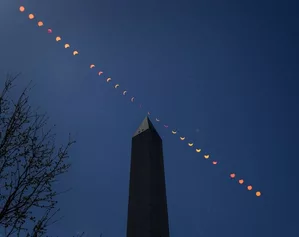Toronto and many other cities and towns of Canada experienced darkness as crowds gathered to witness the total solar eclipse. In Toronto, clouds obscured the sun but during the 99.7 percent total solar eclipse, it became pitch dark and cold. Lights went on at York University during the eclipse.
Paul Delaney, Canada’s top astronomer and former York University professor, explained the scientific significance of the solar eclipse. He mentioned how it impacts the atmosphere and radiowave propagation, with NASA launching sounding rockets to monitor changes in the upper atmosphere from Niagara Falls. The eclipse allowed studying the diameter of the sun and magnetic fields around it.
The last total solar eclipse in Toronto was in 1925, and this rare phenomenon provides valuable scientific data. Delaney mentioned the significance of past eclipses in scientific discoveries, such as in 1919 when Arthur Eddington verified Einstein’s theory of relativity. While total solar eclipses occur every 18 months globally, North America will have to wait until 2044 for the next one.
The excitement and scientific insights gained from witnessing the total solar eclipse in Toronto showcase the importance of studying these rare events. With millions of people across Canada coming together to observe this phenomenon, it highlights the wonder and significance of astronomical events in our lives.

 Lawsuit Slapped Against Chicago-Area Teacher And High School For Childhood Sexual Abuse
Lawsuit Slapped Against Chicago-Area Teacher And High School For Childhood Sexual Abuse 10 YO Sammy Teusch from Indiana Killed Himself After Relentless Bullying At School
10 YO Sammy Teusch from Indiana Killed Himself After Relentless Bullying At School Taxi Drivers Welcome Ruling That Found City Of Ottawa Negligent In Allowing Uber To Operate
Taxi Drivers Welcome Ruling That Found City Of Ottawa Negligent In Allowing Uber To Operate WATCH VIDEO: Dublin-New York Portal Shut Down After Onlyfans Model Ava Louise Flashes Her B**bs on It
WATCH VIDEO: Dublin-New York Portal Shut Down After Onlyfans Model Ava Louise Flashes Her B**bs on It Slovak PM Robert Fico Shot And Wounded, In A Life Threatening Condition
Slovak PM Robert Fico Shot And Wounded, In A Life Threatening Condition Dixie Hills Shooting In Atlanta, Georgia: Three Died During Lil Baby Music Video Filming
Dixie Hills Shooting In Atlanta, Georgia: Three Died During Lil Baby Music Video Filming Kenya Finance Bill: Vehicle Owners To Bear The Brunt, Will Have To Pay Annual Tax Of Up To Ksh 100,000
Kenya Finance Bill: Vehicle Owners To Bear The Brunt, Will Have To Pay Annual Tax Of Up To Ksh 100,000 Anthony Geisler, Xponential Fitness Founder and CEO Suspended “Indefinitely” Amid Fraud Allegations
Anthony Geisler, Xponential Fitness Founder and CEO Suspended “Indefinitely” Amid Fraud Allegations